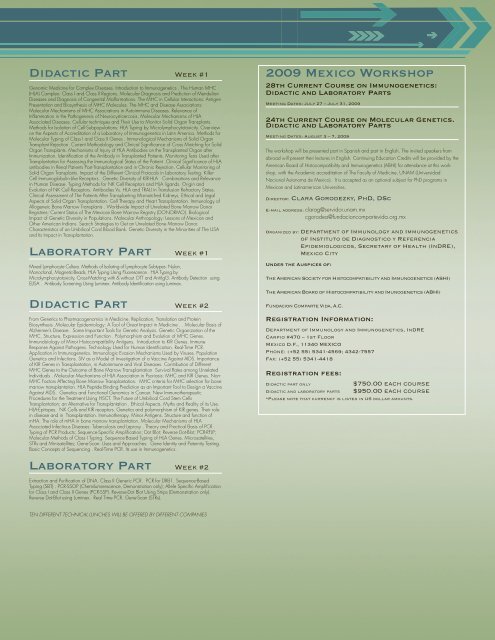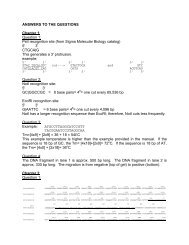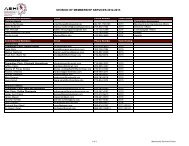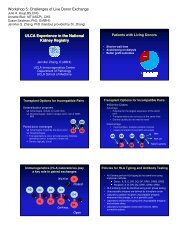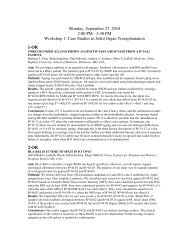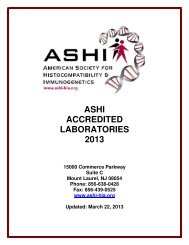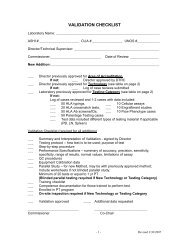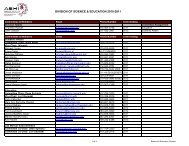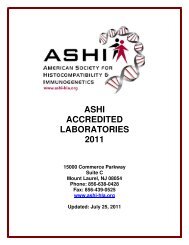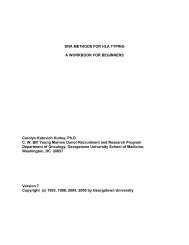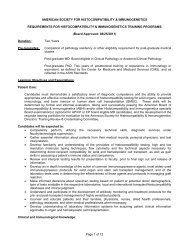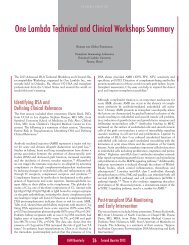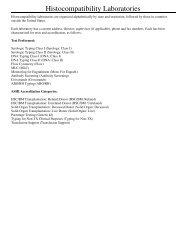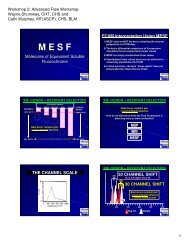2009 Program Information - American Society for Histocompatibility ...
2009 Program Information - American Society for Histocompatibility ...
2009 Program Information - American Society for Histocompatibility ...
Create successful ePaper yourself
Turn your PDF publications into a flip-book with our unique Google optimized e-Paper software.
Didactic Part Week #1<br />
Genomic Medicine <strong>for</strong> Complex Diseases. Introduction to Immunogenetics . The Human MHC<br />
(HLA) Complex: Class I and Class II Regions. Molecular Diagnosis and Prediction of Mendelian<br />
Diseases and Diagnosis of Congenital Mal<strong>for</strong>mations. The MHC in Cellular Interactions: Antigen<br />
Presentation and Biosynthesis of MHC Molecules. The MHC and Disease Associations:<br />
Molecular Mechanisms of MHC Associations in Autoimmune Diseases. Relevance of<br />
Inflammation in the Pathogenesis of Neurocysticercosis. Molecular Mechanisms of HLA<br />
Associated Diseases. Cellular techniques and Their Use to Monitor Solid Organ Transplants.<br />
Methods <strong>for</strong> Isolation of Cell-Subpopulations: HLA Typing by Microlymphocytotoxicity. Overview<br />
on the Aspects of Accreditation of a Laboratory of Immunogenetics in Latin America. Methods <strong>for</strong><br />
Molecular Typing of Class I and Class II Genes . Immunological Mechanisms of Solid Organ<br />
Transplant Rejection. Current Methodology and Clinical Significance of Cross Matching <strong>for</strong> Solid<br />
Organ Transplants. Mechanisms of Injury of HLA Antibodies on the Transplanted Organ after<br />
Immunization. Identification of the Antibody in Transplanted Patients. Monitoring Tests Used after<br />
Transplantation <strong>for</strong> Assessing the Immunological Status of the Patient .Clinical Significance of HLA<br />
antibodies in Renal Patients Post-Transplantation and in Chronic Rejection. Cellular Monitoring of<br />
Solid Organ Transplants. Impact of the Different Clinical Protocols in Laboratory Testing. Killer-<br />
Cell Immunoglobulin-Like Receptors. Genetic Diversity of KIR-HLA Combinations and Relevance<br />
in Human Disease. Typing Methods <strong>for</strong> NK Cell Receptors and HLA ligands. Origin and<br />
Evolution of NK Cell Receptors. Antibodies Vs. HLA and TRALI in Transfusion Refractory States.<br />
Clinical Assessment of The Patients After Transplanting Mismatched Kidneys, Ethical and Legal<br />
Aspects of Solid Organ Transplantation. Cell Therapy and Heart Transplantation. Immunology of<br />
Allogeneic Bone Marrow Transplants . Worldwide Impact of Unrelated Bone Marrow Donor<br />
Registries: Current Status of The Mexican Bone Marrow Registry (DONORMO). Biological<br />
Impact of Genetic Diversity in Populations. Molecular Anthropology: Lessons of Mexican and<br />
Other <strong>American</strong> Indians. Search Strategies to Get an Unrelated Bone Marrow Donor.<br />
Characteristics of an Umbilical Cord Blood Bank. Genetic Diversity in the Minorities of The USA<br />
and Its Impact in Transplantation.<br />
Laboratory Part Week #1<br />
Mixed Lymphocyte Culture. Methods of Isolating of Lymphocyte Subtypes: Nylon,<br />
Monoclonal, Magnetic-Beads, HLA Typing Using Fluorescence . HLA Typing by<br />
Microlymphocytotoxicity. Cross-Matching with & without DTT and Anti-IgG. Antibody Detection using<br />
ELISA . Antibody Screening Using Luminex. Antibody Identification using Luminex.<br />
Didactic Part Week #2<br />
From Genetics to Pharmacogenomics in Medicine. Replication, Translation and Protein<br />
Biosynthesis .Molecular Epidemiology: A Tool of Great Impact in Medicine . . Molecular Basis of<br />
Alzheimer’s Disease. Some Important Tools <strong>for</strong> Genetic Analysis. Genetic Organization of the<br />
MHC, Structure, Expression and Function . Polymorphism and Evolution of MHC Genes.<br />
Immunobiology of Minor <strong>Histocompatibility</strong> Antigens. Introduction to KIR Genes. Immune<br />
Response Against Pathogens. Technology Used <strong>for</strong> Human Identification. Real-Time PCR.<br />
Application in Immunogenetics. Immunologic Evasion Mechanisms Used by Viruses. Population<br />
Genetics and Infections. SIV as a Model of Investigation of a Vaccine Against AIDS. Importance<br />
of KIR Genes in Transplantation, in Autoimmune and Viral Diseases. Contribution of Different<br />
MHC Genes to the Outcome of Bone Marrow Transplantation Survival Rates among Unrelated<br />
Individuals . Molecular Mechanisms of HLA Association in Psoriasis: MHC and KIR Genes. Non-<br />
MHC Factors Affecting Bone Marrow Transplantation. MHC criteria <strong>for</strong> MHC selection <strong>for</strong> bone<br />
marrow transplantation. HLA Peptide Binding Prediction as an Important Tool to Design a Vaccine<br />
Against AIDS. Genetics and Functional Genomics in Cancer. New Immunotherapeutic<br />
Procedures <strong>for</strong> the Treatment Using HSCT. The Future of Umbilical Cord Stem Cells<br />
Transplantation; an Alternative <strong>for</strong> Transplantation . Ethical Aspects, Myths and Reality of its Use.<br />
HLA-Epitopes. NK Cells and KIR receptors. Genetics and polymorphism of KIR genes. Their role<br />
in disease and in Transplantation. Immunotherapy. Minor Antigens. Structure and function of<br />
mHA. The role of mHA in bone marrow transplantation. Molecular Mechanisms of HLA<br />
Associated Infectious Diseases: Tuberculosis and Leprosy . Theory and Practical Basis of PCR .<br />
Typing of PCR Products; Sequence-Specific Amplification; Dot Blot; Reverse Dot-Blot; PCR-RFLP;<br />
Molecular Methods of Class I Typing. Sequence-Based Typing of HLA Genes. Microsatellites,<br />
STRs and Minisatellites; Gene-Scan: Uses and Approaches: Gene Identity and Paternity Testing.<br />
Basic Concepts of Sequencing . Real-Time PCR. Its use in Immunogenetics.<br />
Laboratory Part Week #2<br />
Extraction and Purification of DNA. Class II Generic PCR. PCR <strong>for</strong> DRB1. Sequence-Based<br />
Typing (SBT) . PCR-SSOP (Chemiluminescence, Demonstration only); Allele Specific Amplification<br />
<strong>for</strong> Class I and Class II Genes (PCR-SSP). Reverse-Dot Blot Using Strips (Demonstration only).<br />
Reverse Dot-Blot using Luminex. Real Time PCR. Gene-Scan (STRs).<br />
<strong>2009</strong> Mexico Workshop<br />
28th Current Course on Immunogenetics:<br />
Didactic and Laboratory Parts<br />
Meeting Dates: July 27 – July 31, <strong>2009</strong><br />
24th Current Course on Molecular Genetics.<br />
Didactic and Laboratory Parts<br />
Meeting Dates: August 3 – 7, <strong>2009</strong><br />
The workshop will be presented part in Spanish and part in English. The invited speakers from<br />
abroad will present their lectures in English. Continuing Education Credits will be provided by the<br />
<strong>American</strong> Board of <strong>Histocompatibility</strong> and Immunogenetics (ABHI) <strong>for</strong> attendance at this workshop,<br />
with the Academic accreditation of The Faculty of Medicine, UNAM (Universidad<br />
Nacional Autonoma de Mexico). It is accepted as an optional subject <strong>for</strong> PhD programs in<br />
Mexican and Latinamerican Universities.<br />
Director: Clara Gorodezky, PhD, DSc<br />
E-mail address: clarag@servidor.unam.mx<br />
cgorodea@fundacioncompartevida.org.mx<br />
Organized by: Department of Immunology and Immunogenetics<br />
of Instituto de Diagnostico y Referencia<br />
Epidemiologicos, Secretary of Health (InDRE),<br />
Mexico City<br />
Under the Auspices of:<br />
The <strong>American</strong> <strong>Society</strong> <strong>for</strong> <strong>Histocompatibility</strong> and Immunogenetics (ASHI)<br />
The <strong>American</strong> Board of <strong>Histocompatibility</strong> and Imunogenetics (ABHI)<br />
Fundacion Comparte Vida, A.C.<br />
Registration <strong>In<strong>for</strong>mation</strong>:<br />
Department of Immunology and Immunogenetics, InDRE<br />
Carpio #470 – 1st Floor<br />
Mexico D.F., 11340 MEXICO<br />
Phone: (+52 55) 5341-4569; 4342-7557<br />
Fax: (+52 55) 5341-4418<br />
Registration fees:<br />
$750.00 each course<br />
$950.00 each course<br />
Didactic part only<br />
Didactic and laboratory parts<br />
*Please note that currency is listed in US dollar amounts.<br />
TEN DIFFERENT TECHNICAL LUNCHES WILL BE OFFERED BY DIFFERENT COMPANIES


